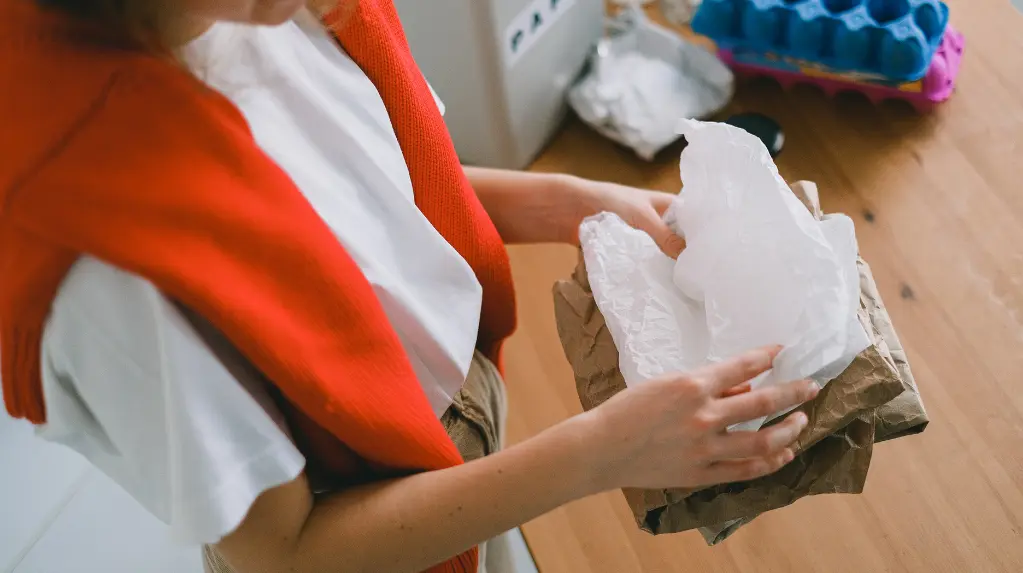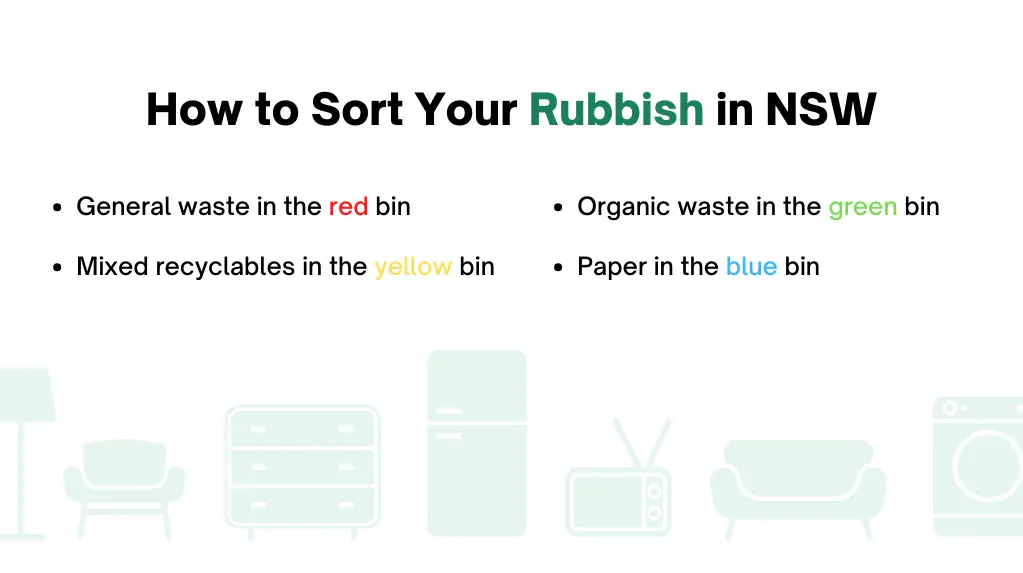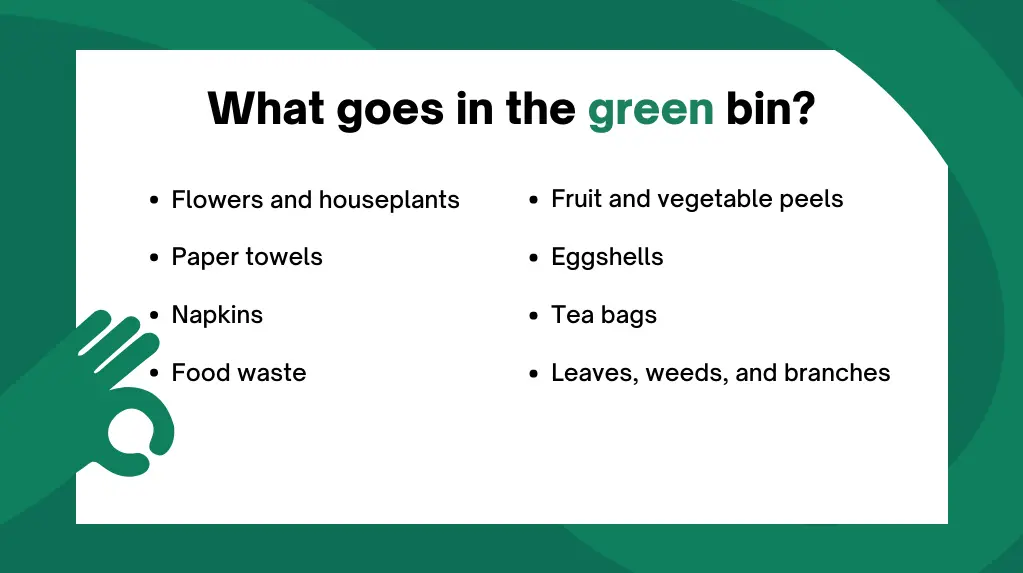
Dealing with household waste and separating recyclable rubbish in Australia can be tricky: There are multiple bins for different purposes, and some items need to go to specific recycling stations.
But once you learn the differences between the different types of rubbish, sorting your waste becomes as easy as ABC. In this article, Ridly will provide a comprehensive guide on how to properly sort rubbish for recycling in Australia.
How to sort rubbish for recycling
Separating rubbish in Australia comes down to using the right bins for each type of waste. Most councils provide four types of bin: each of which have either a red, yellow, green, or blue lid. Before we jump into how to sort rubbish, let’s look at each of the four types of bins available to each Australian home.

Sorting your general waste
While bin lid colours vary from state to state, the red bin is always the one designed for general waste.
Red bins in Australia are used to dispose of general household waste. It's your go-to general waste bin for everything that cannot be recycled or composted. Here are a few examples of what goes in the red bin:
- Baking Paper
- Cellophane
- Chip packets
- Cigarette buds
- Coffee pods
- Fabric
- Frying oil (sealed in acontainer)
- Laminated paper and cardboard
- Lids
- Old medication
- Pet Waste
- Rubber bands
- Sanitary products
- Takeaway containers
- Tissues
These are just a few examples of rubbish that belongs in the red bin. When considering which bin you should sort your waste into, consider if the rubbish itself could be recycled or composted – if not, the rubbish can be sorted to go into the red bin.
Sorting mixed recycling
Items that can be recycled need to be sorted and separated from general waste.
Australia uses bins with yellow lids for mixed recycling. Everything that can be recycled belongs in the yellow bin, including rubbish made from cardboard, metal, and glass. The types of items that can be separated and sorted from general waste for mixed recycling include:
- Cardboard boxes such as packaging, cereal boxes, shoe boxes
- Pizza boxes
- Paper Bags
- Paper towels
- Envelopes and junk mail
- Glass bottles and jars
- Plastic bottles and containers
- Milk cartons
- Juice boxes
- Steel cans
- Aluminium cans
- Aerosol cans such as deodorants or empty camping gas cartridges
- Tin foil
- Baking trays
- Egg cartons
- Ice cream tubs

This separation and sorting of waste between yellow and red bins reduces the amount of recyclable resources that end up in landfill.
When sorting your mixed recyclables, remember to rinse containers that have had food or liquids in them before disposing of them in the yellow bin. Not rinsing containers means potentially contaminating the valuable recycling material with general waste or organic matter, making it unusable for recycling.
Note: Local councils may have different rules on what belongs in the yellow bin, as some local areas may additionally have blue bins for recycling paper and cardboard.
Sorting your organics
It’s important to sort and separate your organic waste from general waste.
Australia's green bin offers households a way of disposing of organic waste in an environmentally friendly way. Instead of ending up with general waste in landfill, green waste needs to go to the right facilities to be accurately disposed of. From there, organic waste is broken down and turned into compost, which can be used across farming and gardening.
Aside from contributing to compost, organic material should not go in the red/general waste bin as it actually causes issues for landfill. Organic matter does not decompose properly in landfill, which means that when it is dumped in landfill, it undergoes anaerobic decomposition (because of the lack of oxygen) and generates methane (green house gas).
Here’s a few of the organic materials that you should be separating from your general waste and disposing of in the green bin:
- Fruit and vegetable peels
- Eggshells
- Tea bags
- Leaves, weeds, and branches
- Flowers and houseplants
- Paper towels
- Napkins
- Food waste

Separate your paper
If you have a blue bin, it’s important to use it correctly by sorting your recyclables and using it for disposing of your paper and cardboard.
You can sort your blue bin waste by:
- Newspapers
- Magazines
- Cardboard boxes
- Cartons
- Cereal boxes
- Toilet paper rolls
If you don’t have a blue bin to further separate your recyclables, chuck these items into the yellow bin to ensure they are still recycled properly.
Separating rubbish that does not go in the bin
Aside from general, organic, mixed recyclable, and paper waste, there are other household items that you will come across that cannot go in the council bins. For items such as:
- Batteries
- Electronics
- Light Bulbs
- Paint
- Plastic Bags
- Scrap metal
- Tyres
You will need to take these items to specific recycling centres to ensure they are adequately disposed of. Don’t have time to sort this rubbish and transport it to your local recycling facility? Hire an expert rubbish removal team to do the dirty work for you!
Sorting rubbish that you can donate
Lastly, an excellent alternative to sorting items to be thrown out is to donate them to charity. Items like clothes, furniture, books, toys, electronics, or sports equipment that you no longer use can make a difference in your community while you declutter. If you are considering if an item is worth giving to charity, check if it ticks these boxes:
- The item is still in good condition and functions correctly
- Someone else could make use of the item
Wrapping up
So – it is clear that learning how to sort rubbish for recycling in Australia doesn’t have to be complicated. Once you’ve got a better idea of what falls under general waste vs recyclable waste and organic matter, it’s as simple as making sure you’re putting your waste in the correct bin.
Can’t be bothered sorting and recycling your own rubbish? No worries – we get it. For those who are busier or who need to dispose of large amounts of rubbish, hire a professional team of rubbish removalists. Sydney’s leading waste collection experts, Ridly, provide cost-effective, environmentally-friendly, and efficient junk removal services.
Give us a call at 0488 846 336 or get a quote by enquiring online today.